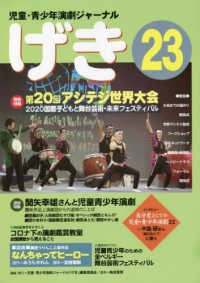Full Description
Food - its cultivation, preparation and communal consumption - has long been considered a form of cultural heritage. A dynamic, living product, food creates social bonds as it simultaneously marks off and maintains cultural difference. In bringing together anthropologists, historians and other scholars of food and heritage, this volume closely examines the ways in which the cultivation, preparation, and consumption of food is used to create identity claims of 'cultural heritage' on local, regional, national and international scales. Contributors explore a range of themes, including how food is used to mark insiders and outsiders within an ethnic group; how the same food's meanings change within a particular society based on class, gender or taste; and how traditions are 'invented' for the revitalization of a community during periods of cultural pressure. Featuring case studies from Europe, Asia and the Americas, this timely volume also addresses the complex processes of classifying, designating, and valorizing food as 'terroir,' 'slow food,' or as intangible cultural heritage through UNESCO. By effectively analyzing food and foodways through the perspectives of critical heritage studies, this collection productively brings two overlapping but frequently separate theoretical frameworks into conversation.
Contents
Contents: Introduction: food and foodways as cultural heritage, Michael A. Di Giovine and Ronda L. Brulotte; Re-inventing a tradition of invention: entrepreneurialism as heritage in American artisan cheesemaking, Heather Paxson; Terroir in D.C.? Inventing food traditions for the nation's capital, Warren Belasco; Of cheese and ecomuseums: food as cultural heritage in the northern Italian Alps, Cristina Grasseni; Edible authenticities: heirloom vegetables and culinary heritage in Kyoto, Japan, Greg de St. Maurice; The everyday as extraordinary: revitalization, religion, and the elevation of cucina casareccia to heritage cuisine in Pietrelcina, Italy, Michael A. Di Giovine; Take the chicken out of the box: demystifying the sameness of African American culinary heritage in the U.S., Psyche Williams-Forson; Caldo De Piedra and claiming pre-Hispanic cuisine as cultural heritage, Ronda L. Brulotte and Alvin Starkman; Hallucinating the Slovenian way: the myth of Salamander Brandy, an indigenous Slovenian psychedelic drug, Miha Kozorog; Haute traditional cuisines: how UNESCO's List of Intangible Heritage links the cosmopolitan to the local, Clare A. Sammells; Reinventing edible identities: Catalan cuisine and Barcelona's market halls, Josep-Maria Garcia-Fuentes, Manel Guà rdia Bassols and José Luis Oyón Bañales; French chocolate as intangible cultural heritage, Susan Terrio; Daily bread, global distinction? The German bakers' craft and cultural value-enhancement regimes, Regina F. Bendix; The Mexican and transnational lives of corn: technological, political, edible object, Erick Castellanos and Sarah Bergstresser; Cultural heritage in food activism: local and global tensions, Carole Counihan; Index.






